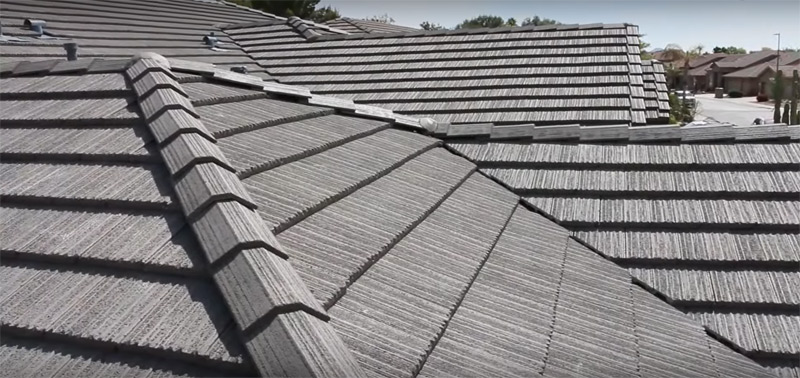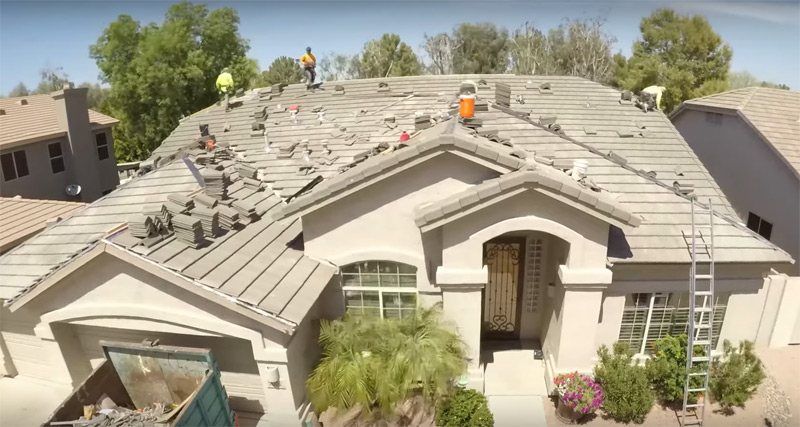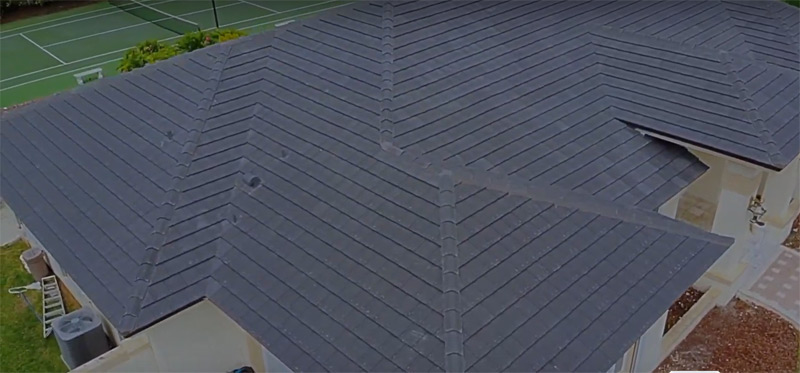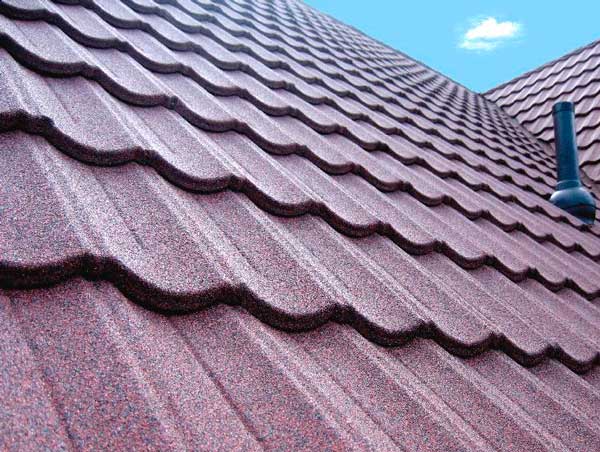Tile Roof Cost In 2024. Roofing Tile Options For Your Home
Do you find yourself captivated by the look of roof tiles? If so, you are just one of many people opting for tiles as their top home roofing material choice!
Although a certain upfront investment comes with choosing tile as your roofing material, the benefits that follow are certainly worth it. Beyond the initial investment, tile roofs are the optimal choice when looking for a durable, long-lasting, energy-efficient, charming, and low-maintenance roofing option. Tile roofing is also great as it is reliable, even in the high-wind locations. Another awesome benefit of tile roofing is that it is fire safety-approved!
The most common traditional tile materials include concrete and clay. Both of these types of tiles come in a variety of shapes, appearances, and colors.
Clay Tiles: What Are They?

Clay tiles are made by bakin clay. The temperature and length of time for which the clay is heated will determine the density of the clay. There are many colors of clay tiles, from yellow, orange, brown, or even white.
Most commonly, however, you will find clay tiles in the Terra-Cotta color. By adding enamels to the tile, manufacturers make these natural earth tones look even more elegant, allowing you to choose from many tile colors!
Thanks to this process, the market has many different tile profiles, styles, finishes, and colors to offer. Clay tiles are both environmentally friendly and easily recycled, as they are madey with natural earth-derived resources.
Whether there is a fire or strong wind, you can rely on clay tiles as they are made to sustain such harsh conditions. Another awesome benefit of clay tiles is that they protect the underlayment of your roof, thanks to their advanced shape. Not only this, but clay tiles also create an air pocket, which helps insulate and isolate unwanted cold and heat from entering your attic.
Best Clay Tile Suppliers and Manufacturers:

Ludowici is a New Lexington, Ohio-based clay tile manufacturer. Ludowici has built a strong reputation for being one of the oldest, and most trusted manufacturers in the area. The team at Ludowici offers a large variety of tiles, perfect for residential, commercial, historic, and institutional projects.
MCA Tile is another one of our favorite clay tile manufacturers. Unlike Ludowici, MCA Tile is located in Corona, California. MCA Tiles offers tiles specifically designed for residential, commercial, and institutional roofing projects.
Alternatively, you can consider purchasing your tiles through a supplier, such as ABC Supply which offers a large variety of clay and concrete tiles.
Concrete Tiles: What Are They?

Unlike clay tiles, a mixture of water, sand, and cement is used to make concrete tiles. To make the tile, these materials are molded under high pressure and plenty of heat. A paint-like material can be used to cover the exterior of the tile, to give it a charming appearance.
To prevent water infiltration, concrete tiles come with interlocking ribs or water locks on the edges. These are the three main appearances in which concrete tiles are available:
- Flat Profile: Curve-free.
- Low Profile: Rise to width ratio no more than 1:5, with small curves.
- High Profile: Rise to width ratio exceeding 1:5, with large curves.
Whether you want to simulate the look of wood shakes, traditional clay tiles, stone, or slate, concrete tiles can do it all. Similar to clay tiles, you can find concrete tiles with smooth or textured surfaces, with edges that are either uniform or ragged. Concrete tiles are known for being a safe and ideal roofing option as they are hail, fire, and wind-resistant when installed correctly.
Best Concrete Tile Suppliers and Manufacturers
Eagle Roofing is a proudly American concrete tile manufacturer. You will be able to find their products through ABC Supply.
Concrete Vs. Clay Tiles: What’s The Difference?
Water Absorption: When it comes to keeping your tiles and roof structure healthy, it is important to consider the water absorption aspects of your tiles. Concrete roofing tiles are more prone to water absorption, which causes more mildew and stains in your tiles. The more water absorbed by your tiles, the more pressure put on your roof structure, which should be avoided when possible. Clay tiles avoid this problem, in most cases, as they hardly absorb any water.
Weight: It is a known fact that concrete tiles weigh significantly more than clay tiles. How much exactly? On average, concrete tiles weigh 40% more than clay tiles. Depending on the tile style, concrete tiles should weigh between 820 and 1100 pounds per 100 square feet. Logically, your roof structure may struggle more to support concrete tile roofing than clay tile roofing. In certain cases, it is suggested to avoid using concrete tiles unless the roof is reinforced to support the required weight.
Likeliness To Break: Determining which tile option will be more durable depends on the climate around you. For warmer climates, clay tiles are most commonly found, as they tend to crack and/or shatter in colder climates, as a result of freezing and thawing cycles.
Conversely, concrete tiles are more durable in colder climates as they are less at risk of being damaged due to cold weather.
Maintenance: Concrete tiles are undoubtedly more challenging to maintain, as a result of their heavier weight, mildew formation, and water absorption. Clay tiles, on the other hand, have far fewer of these problems, making them the easiest to maintain out of the two.
Color and Appearance: Although they may be surrounded by hot weather and sun, clay tiles keep their original color for a long time, as clay is a naturally occurring material. Many clay roof tile providers offer tiles with ceramic finishes, baked in temperatures exceeding 2000 degrees, thus, making these tiles durable, even in hot weather and directly under the sun.
As for concrete tiles, although they are made with a color-thru technology, they're still not as long-lasting when it comes to maintaining their original color. They will undoubtedly look beautiful at first. However, concrete tiles are known for slowly fading and losing their color with time.
As a result of its porous nature, stains are more common in concrete tiles, while clay tiles rarely get stained.
Durability: It’s safe to say that both concrete and clay tiles make it to the top of our list of best roofing materials. However, clay tiles remain more durable than concrete. As previously mentioned, concrete tiles usually only last up to 50 years, while you can get twice this lifespan out of clay tiles.
As a matter of fact, many antique buildings in Europe still have their original beautiful clay roofs that have been there for hundreds of years.
Stone-Coated Steel: Another Great Roofing Option

One of the most commonly seen complaints from people with concrete, clay, and Terra-cotta tiles is that these materials are all quite heavy. Due to their excessive weight, these roofing materials often require reinforcing the roof structure, to be able to support the weight put on it.
Thankfully, you can avoid this problem with stone-coated steel tiles that are not only light but also very attractive and cheaper than most traditional roofing options out there!
Not only does stone-coated steel come without the excessive weight seen in other roofing tile options, but it also offers comparable performance without the need to reinforce your home’s roof structure!
Take Berral Vault tiles from Boral Steel as an example. Their team does a fantastic job of recreating the appearance of other more commonly used tiles, all while keeping the cost much lower! Depending on your location, as well as the size of the order you place, stone-coated steel costs between $3 and $5 per square foot, on average, all without the unneeded weight.
Cost: Concrete Tiles vs. Clay Tiles
Clay tiles tend to cost more than concrete tiles. More precisely, clay tile roofing will most likely cost you between 20% and 30% more than the alternative concrete tile roofing option. Clay tiles usually cost between $13 and $25 per square foot of roof.
However, those looking for more exotic tiles should be prepared to pay up to $30 per square foot replacement. That said, the price of tiles can greatly fluctuate depending on the fanciness and quality of the tile.
How Much Does a Tile Roof Cost to Install?
Looking at overall costs for a complete roofing project, the average price of installing a basic tile roof will likely be between $25,000 and $50,000. The total cost of your project will, of course, depend on the size of your house, roof complexity, the tile you have chosen, and the location of your home.